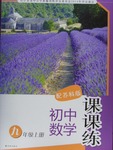
閱讀理解
Joe Burns is a famous racing-driver. He is being interviewed on a sports programme.
Reporter: You've had a very dangerous life, haven't you, Joe? I mean, you've almost been killed several times, haven't you?
Joe: Yes, I suppose that's right.
Reporter: When was your worst accident?
Joe: It was during the British Grand Prix (英國汽車大賽). I ran into a wall. The car was completely broken and my left leg was broken. Luckily, nobody was killed.
Reporter: Was that the only time you had been… er… close to death?
Joe: No. Once, during the Mexican Grand Prix, two cars in front of me had a bad accident. One of them ran into the other. I drove away to avoid them and hit a fence. My car was badly damaged but luckily I was not hurt.
Reporter: You must enjoy danger. I mean, you wouldn't be a racing-driver if you didn't, would you?
Joe: I don't know about that. I had a very frightening experience not long ago. I was almost frightened to death. I thought I was going to be killed at any moment.
Reporter: Really? When was that? During your last race?
Joe: No, it was on my way to this studio. I had to drive through London during the lunch hour.
(1)The conversation takes place when ________.
[ ]
A.Joe Burns is meeting with a reporter
B.Joe Burns wants a reporter to meet him
C.Joe Burns meets with the reporter by chance
D.Joe Burns is talking with a friend who is a reporter
(2)Joe Burns has had a dangerous life because ________.
[ ]
(3)Joe had his worst accident ________.
[ ]
(4)During their conversation the reporter ________.
[ ]
A.would probably listen carefully and take notes
B.would not take notes
C.would pay no attention to what Joe said
D.had a frightening experience
(5)Joe Burns ________.
[ ]
A.was frightened to drive through London during the lunch hour
B.thought he would be killed by the people
C.was frightened by the people who watched him driving through London
D.thought it frightening to drive through London during the lunch hour
 課課練江蘇系列答案
課課練江蘇系列答案 名牌中學(xué)課時(shí)作業(yè)系列答案
名牌中學(xué)課時(shí)作業(yè)系列答案 明天教育課時(shí)特訓(xùn)系列答案
明天教育課時(shí)特訓(xùn)系列答案 浙江新課程三維目標(biāo)測評(píng)課時(shí)特訓(xùn)系列答案
浙江新課程三維目標(biāo)測評(píng)課時(shí)特訓(xùn)系列答案
| 年級(jí) | 高中課程 | 年級(jí) | 初中課程 |
| 高一 | 高一免費(fèi)課程推薦! | 初一 | 初一免費(fèi)課程推薦! |
| 高二 | 高二免費(fèi)課程推薦! | 初二 | 初二免費(fèi)課程推薦! |
| 高三 | 高三免費(fèi)課程推薦! | 初三 | 初三免費(fèi)課程推薦! |
科目:高中英語 來源: 題型:053
閱讀理解
Joe worked in his father's shop before he worked alone. His father stopped working when he became old. Joe sold more in his shop on Saturdays than on other days. He did not bring all of his meat to his shop himself, because he was too busy. He did not keep much meat in his refrigerator (冰箱), because he tried to sell it quickly. One Thursday a woman came to his shop very late because she needed some meat for some visitors that evening. The woman wanted a bigger piece than the only good one that Joe had, but he did not say that he had not got one. He went into the room behind his shop, opened the refrigerator, put the piece into it, then took it out again and shut the door of the refrigerator with a lot of noise. Then he brought the piece of meat back to the woman and said that it was bigger and dearer than the first one, but it was really the same piece. The woman said with a smile that she wanted both pieces.
1.Joe had to begin to work alone in the shop ________.
[ ]
A.when his father became ill
B.a(chǎn)fter his father passed away
C.when his father stopped to rest
D.when his father became too old to work
2.How did he get his meat?
[ ]
A.His father and he brought it to the shop.
B.Other people as well as he brought it to the shop.
C.The seller drove to sell it in the city.
D.He himself drove to buy it in the city.
3.Joe had only one piece of good meat because ________.
[ ]
A.a(chǎn)ll the other meat had gone bad
B.he did not try to buy too much meat at one time
C.he could not get enough good meat that day
D.he could not keep all his meat all day long
4.The woman did not want that piece of meat because it was not ________.
[ ]
查看答案和解析>>
科目:高中英語 來源: 題型:053
閱讀理解
Manuel and Joe were traders with the Pawnee Indians. Each of them tried to acquire by trade as many furs as possible for himself, using whatever means possible and without showing mercy towards the other. For that reason, they often quarreled. In order to prevent such hot arguments they agreed that if a band of Indians arrived at their trading posts for the purpose of exchange and barter(實(shí)物交換), neither would attempt to take advantage of the other. Manuel, however, had no intention of trading on honorable terms for any length of time; once when both of them expected a band of Pawnee, he tried to fool Joe.
One day while he ordered his post supplied in secret with commodities to barter with the Pawnee, he went over to see Joe in order to put him off his guard, by his own presence there to hinder(打擾)preparations, and to see what was really going on in the other store house. Joe played the part of unsuspecting(不懷疑的) host just as well as his opponent(對(duì)手)played his role. He acted just as though he had allowed himself to be really fooled. He invited Manuel to drink a glass of champagne to the success of prospective(預(yù)期的) trade; but regretted that on account of his bad back he was not able to stoop down and therefore, would have to ask Manuel to fetch the cask from the cellar. The latter obligingly raised the trapdoor in the room and went down the steps. Joe let fall the door, rolled a cask upon it, with mocking (嘲笑的)words left his opponent imprisoned, then, went off to trade alone with the Pawnee.
(1)Manuel and Joe often quarreled because ________.
[ ]
A.they couldn't trade with the Pawnee Indians
B.they couldn't trade as many furs as they wanted to
C.Joe locked Manuel in the cellar
D.they competed mercilessly with each other
(2)Manuel went to Joe's for the reason that ________.
[ ]
A.he wanted to hinder Joe's trading preparations
B.he wanted to help Joe get his commodities prepared
C.he wanted to start a quarrel
D.he wanted to make an agreement
(3)How did Joe feel about Manuel's visit?
[ ]
A.He was completely fooled.
B.He knew the real reason for it.
C.He was angry with Manuel had accepted his invitation for a drink.
D.He was glad that Manuel had accepted his invitation for a drink.
(4)Why did Joe ask Manuel to fetch the champagne?
[ ]
A.Joe was too busy to get it himself.
B.Joe had a bad back and could not stoop down.
C.Joe was too lazy to get it.
D.Joe wanted to trap Manuel.
查看答案和解析>>
科目:高中英語 來源:河北省唐山一中2009屆高三上學(xué)期調(diào)研考試(一)英語試題 題型:050
| |||||||||||||||||||||||||||||||||||||||||||||||||||||||||||
查看答案和解析>>
科目:高中英語 來源:江西省南昌市2011屆高三第一次模擬考試英語試題 題型:050
| |||||||||||||||||||||||||||||||||||||||||||||||||||||||||||
查看答案和解析>>
百度致信 - 練習(xí)冊(cè)列表 - 試題列表
湖北省互聯(lián)網(wǎng)違法和不良信息舉報(bào)平臺(tái) | 網(wǎng)上有害信息舉報(bào)專區(qū) | 電信詐騙舉報(bào)專區(qū) | 涉歷史虛無主義有害信息舉報(bào)專區(qū) | 涉企侵權(quán)舉報(bào)專區(qū)
違法和不良信息舉報(bào)電話:027-86699610 舉報(bào)郵箱:58377363@163.com